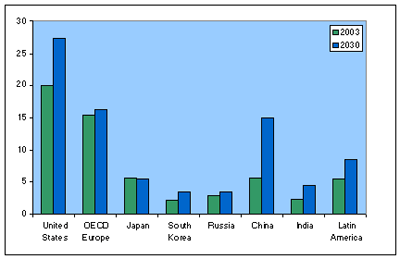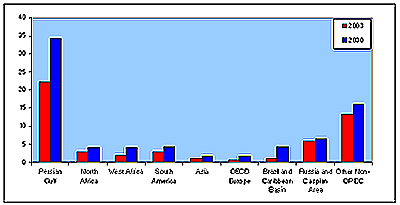If the conflict-ridden and oil-rich Middle East today is
crucial to the national interest of superpowers and stability of the global
economy, future worldwide dependency on the region for oil will push the
international system into new frontiers of conflict and chaos.
The region has been a vital source of oil not only for
Western but also Eastern powers. China, Japan, and India have been and will be
as much dependent on Middle Eastern oil as the United States and Western
Europe. What makes oil one of the most important minerals is humankind's
reliance on an oil-based economy. It flows through the economy, empowering
various sectors from fueling the vast majority of the transportation sector,
powering factories and appliances, to the production of chemical and
petrochemical products. It is this vital role of oil in feeding the
productivity of modern economies, which explains the inexorable present and
future global demand for it.
Historically the demand for oil has been rising. The world
average demand jumped from 47 million barrels per day in 1970 to 85 million
barrels per day in 2006. Leading the rank of consumption by far is the United
States, increasing its average demand from 1970 to 2006 by 140 per cent. [1]
Similarly, China, Japan, Russia, Germany, India, and South Korea have been
notorious consumers, and their appetites for oil, like the rest of the world,
are also trending upward.
Future global demand for oil is expected to surge,
increasing from 80.1 million barrels per day in 2003 to 118 million barrels per
day in 2030. The highest increase will occur in countries industrializing at a
rapid pace, like China and India. To stimulate potential economic growth,
China�s share is projected to rise from 5.6 million barrels per day in 2003 to
15.0 million barrels per day 2030; in the same period, India is expected to
jump from 2.3 to 4.5 million barrels per day. As for the United States, the top
consumer, its share is projected to reach 27.6 million barrels per day in 2030
(Figure 1).
 |
| Figure 1: Oil Consumptions, 2003 and 2030 (Million Barrels per Day). Source: Energy Information Administration. |
Much of the growth in oil demand will be supplied from
Middle Eastern oil wells. With 728 billion barrels of proven reserve in 2006,
accounting for 55 per cent of the world�s reserves, the region is sitting on
the largest oil reserve and has the lowest production costs in the world
(Figure 2).
 |
| Figure 2: Oil Exports, 2003 and 2030 (Million Barrels per Day). Source: Energy Information Administration. |
Oil supply however is not everlasting. Because of worldwide
rising consumption the day when oil wells begin to deplete will eventually
arrive. Holding other variables constant, at the rate of production in 2004,
proven oil reserves for the members of the Organization of the Petroleum
Exporting Countries (OPEC), which includes almost all Middle Eastern producers,
will last for 83 years. For Non-OPEC members oil reserves will last for about
26 years. Against this inevitable background of decline in production rates,
oil prices will continue to climb. Assuming that no cheap, abundant, and
versatile source of energy emerges as a substitute for oil, both exporting and
importing countries are heading toward economic hardships and political
instability.
For exporting countries, in the short-to-medium-term, high
oil prices will generate budget surpluses and boost their economies. Things,
however, are quite different in the long-term for oil revenues will ebb, due to
reduction in reserves, causing dramatic political and economical upheavals.
Because oil revenues for top oil producing countries represent the main source
of their revenues, in the long-term the surpluses will turn into deficits and
economic growth into recession. These economic effects are compounded by a
precarious political order, as oil exporting countries in the Middle East are
not democracies and lack legitimacy. Political scientists described these
states as �renter states� to suggest that rent derived from international sale
of oil is used to �buy off� political consent of various groups. If the cash
flow from oil revenues dwindles, these states will face political upheaval and
the door will fling wide open for domestic tensions and conflicts.
The future is no less dark for importing countries. In the
long-term, under the pressure of high oil prices and decline in reserves,
importing countries are forced to spend more on oil expenditures. Higher
expenditures will reverberate throughout the economy, leading to higher
transportation and manufacturing costs, as well as reduction in consumers�
confidence and spending; ultimately cumulating in a worldwide recession.
Recognizing the strategic value of oil for their national
interests, superpowers will not hesitate to unleash their economic and military
power to ensure secure access to oil resources, triggering worldwide tension,
if not armed conflict. And while superpowers like the United States maintain
superior conventional military power, in addition to nuclear power, some weaker
states are already nuclear weapons, others are seeking nuclear weapons. In an
world with many nuclear-weapon states feeling insecure, and a global economy in
downward spiral, the chances of using nuclear weapons in pursuit of national
interests are high.
What all of this means is that when reserves are exhausted
oil will turn from a blessing to a curse. When the curse strikes, a new world
order will emerge, in which today�s ways of life, politics and conflicts will
be not the same. The rising oil prices and current international tension over
nuclear capabilities are telling signs about the kind of future awaiting
humanity. Alas, we are all waiting for the final drop of oil to trickle before
reaching the zenith of a disaster which is already in the making.
1. Data, including consumption, exports, and reserves, are
taken from the Energy Information Administration (EIA), web site www.eia.doe.gov.
Islam
Yasin Qasem is a doctoral candidate in the Department of Politics and Social
Sciences at the University of Pompeu Fabra (UPF) in Barcelona, Spain. His
research and teaching interests include Politics of Islam, Middle East Politics,
and International Politics of Oil. Some of his articles are published in the
English and Spanish press. He also teaches a class on Middle East Politics at
UPF. He holds a Master Degree in International Affairs from Columbia University
in New York City, and an Advanced Degree in Political and Social Sciences from
UPF.